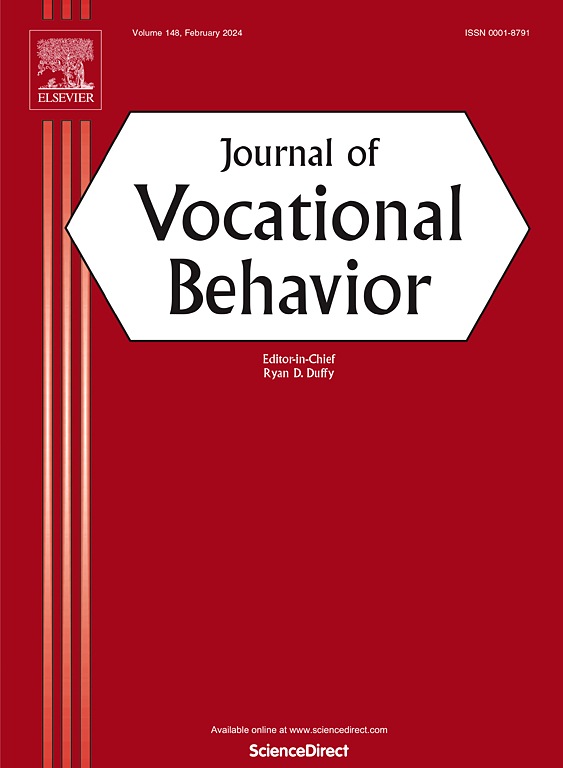Don't leave the good things in the rearview! A field experiment examining the influence of a positive work reflection intervention on taxi drivers' work behaviors
IF 5.2
1区 心理学
Q1 PSYCHOLOGY, APPLIED
引用次数: 0
Abstract
As service jobs tend to be demanding and exhausting, it is critical to identify ways that help service employees stay positive and engage in behaviors that represent high quality customer service. Drawing upon affective events theory, this research aims to examine how a positive work reflection intervention influences service employees' work behaviors via positive affect and the role of promotion focus as a personality moderator. We used a between-subjects design to test the effects of the “three good things” positive work reflection intervention in a field experiment. Data were collected from 74 taxi drivers who were randomly assigned into either an intervention condition or a control condition. They rated their positive affect and work behaviors using daily diary surveys for 7 consecutive days, during which participants in the intervention condition completed the “three good things” exercise at the end of each workday. Results showed that participants in the intervention condition reported higher levels of morning positive affect compared to participants in the control condition, but only for those with higher levels of promotion focus. Further, the intervention indirectly increased extra-role service behavior and reduced rule breaking behavior and passive response to entitled customer demands via positive affect for individuals with higher levels of promotion focus. The intervention showed opposite effects for individuals with lower levels of promotion focus. The intervention also directly enhanced employees' active response in handling entitled customer demands. Our findings suggest that a simple exercise like the “three good things” positive work reflection intervention can significantly influence service employees' work behaviors and the importance of considering the alignment between the intervention and individual differences.
不要把美好的事情抛在脑后!积极工作反思干预对出租车司机工作行为影响的现场实验研究
由于服务工作往往要求很高,令人筋疲力尽,因此找到方法帮助服务员工保持积极的态度,并参与代表高质量客户服务的行为是至关重要的。基于情感事件理论,本研究旨在探讨积极的工作反思干预如何通过积极情感和晋升关注作为人格调节因子对服务员工的工作行为产生影响。我们采用被试间设计,在现场实验中检验“三好”积极工作反思干预的效果。数据来自74名出租车司机,他们被随机分配到干预组和对照组。他们连续7天使用每日日记调查来评估自己的积极影响和工作行为,在此期间,干预条件下的参与者在每个工作日结束时完成“三件好事”锻炼。结果表明,与对照组相比,干预组的参与者报告了更高水平的早晨积极影响,但仅限于那些具有更高水平的促销焦点的参与者。此外,干预通过正向影响间接增加了角色外服务行为,减少了违规行为和对顾客权利要求的被动反应。干预对那些关注提升程度较低的个体显示出相反的效果。干预亦直接提高了员工在处理顾客要求时的积极反应。我们的研究结果表明,“三件好事”积极工作反思干预可以显著影响服务员工的工作行为,并且考虑干预与个体差异之间的一致性的重要性。
本文章由计算机程序翻译,如有差异,请以英文原文为准。
求助全文
约1分钟内获得全文
求助全文
来源期刊

Journal of Vocational Behavior
PSYCHOLOGY, APPLIED-
CiteScore
13.10
自引率
5.40%
发文量
85
期刊介绍:
The Journal of Vocational Behavior publishes original empirical and theoretical articles offering unique insights into the realms of career choice, career development, and work adjustment across the lifespan. These contributions are not only valuable for academic exploration but also find applications in counseling and career development programs across diverse sectors such as colleges, universities, business, industry, government, and the military.
The primary focus of the journal centers on individual decision-making regarding work and careers, prioritizing investigations into personal career choices rather than organizational or employer-level variables. Example topics encompass a broad range, from initial career choices (e.g., choice of major, initial work or organization selection, organizational attraction) to the development of a career, work transitions, work-family management, and attitudes within the workplace (such as work commitment, multiple role management, and turnover).
 求助内容:
求助内容: 应助结果提醒方式:
应助结果提醒方式:


